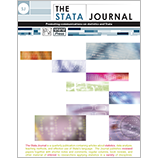Rethinking literate programming in statistics
E. F. Haghish
Center for Medical Biometry and Medical Informatics
University of Freiburg
Freiburg, Germany
and
Department of Mathematics and Computer Science
University of Odense
Odense, Denmark
[email protected]
|
Abstract. Literate programming is becoming increasingly trendy for data analysis because
it allows the generation of dynamic-analysis reports for communicating data
analysis and eliminates untraceable human errors in analysis reports.
Traditionally, literate programming includes separate processes for compiling
the code and preparing the documentation. While this workflow might be
satisfactory for software documentation, it is not ideal for writing
statistical analysis reports. Instead, these processes should run in parallel.
In this article, I introduce the weaver package, which examines this
idea by creating a new log system in HTML or LATEX that can be used
simultaneously with the Stata log system. The new log system provides many
features that the Stata log system lacks; for example, it can render
mathematical notations, insert figures, create publication-ready dynamic
tables, and style text, and it includes a built-in syntax highlighter. The
weaver package also produces dynamic PDF documents by converting the
HTML log to PDF or by typesetting the LATEX log and thus provides a real-time
preview of the document without recompiling the code. I also discuss potential
applications of the weaver package.
View all articles by this author:
E. F. Haghish
View all articles with these keywords:
weave, div, img, txt, tbl, weaver, weaving, literate programming, dynamic documents, reproducible research, log, HTML, LaTeX
Download citation: BibTeX RIS
Download citation and abstract: BibTeX RIS
|
